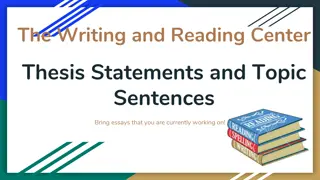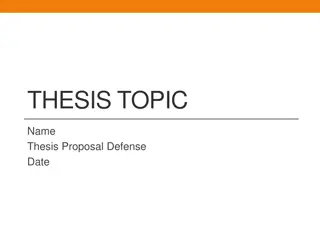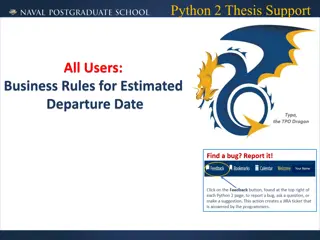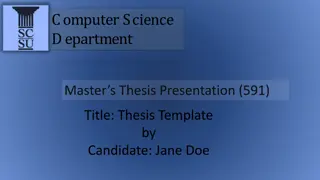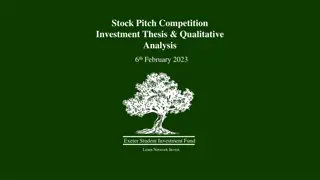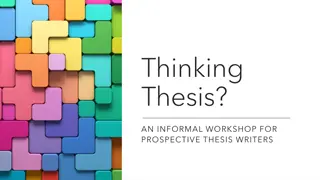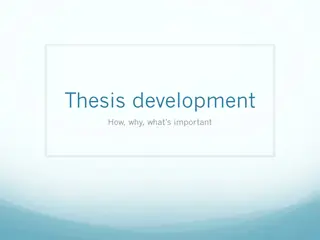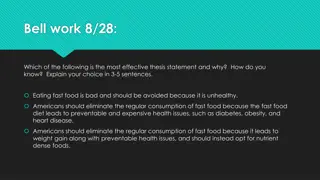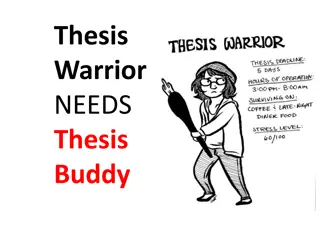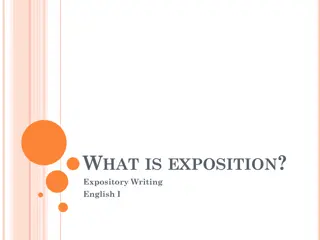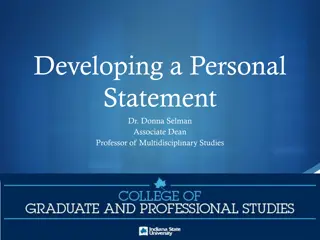Crafting a Strong Thesis Statement for Literary Analysis
Crafting a strong thesis statement is crucial for any literary analysis. A thesis statement comprises the writer's purpose and subtopics, with the writer's purpose being the specific point needing argumentation. This summary guides you through understanding the writer's purpose, creating an effective statement, and developing supporting subtopics using conceptual ideas distinct from text examples.
Download Presentation

Please find below an Image/Link to download the presentation.
The content on the website is provided AS IS for your information and personal use only. It may not be sold, licensed, or shared on other websites without obtaining consent from the author. Download presentation by click this link. If you encounter any issues during the download, it is possible that the publisher has removed the file from their server.
E N D
Presentation Transcript
Constructing a Thesis Statement--Elevating the Argument
A thesis statement consists of two parts: A.the writer s purpose B.the subtopics.
The writers purpose refers to the writer s specific opinion on a topic. You are the writer, so the writer s purpose is the specific point you are proving. Your writer s purpose must be arguable.
Not a writers purpose: Odysseus was fighting in the Trojan war for ten years. *This statement is just that, a statement of information. There is no argument to be proven.
Effective writers purpose: Odysseus is responsible for the deaths of his men. *This statement is an effective writer s purpose because it is a claim that can be argued. Another writer can disagree and claim that Odysseus is not responsible for the deaths of his men.
Odyssey Books1,9,10 Assessment Short Response: Directions: Create a thesis statement for the following prompt and provide two subtopics supporting your stance. PROMPT: Is Polyphemus justified in his desire to kill Odysseus and his men?
Writers purpose: Polyphemus is justified in his desire to kill Odysseus. OR Writer s purpose: Polyphemus is not justified in his desire to kill Odysseus.
Subtopics: Your subtopics are the reasons that will support your writer s purpose. Your subtopics should be conceptual ideas that support your writer s purpose. When you begin to write your body paragraph, you will use examples from the text to develop and substantiate your subtopic that will be a concept or abstract idea related to the prompt. Your subtopics should not be examples from the text.
Subtopics that are examples: 1. Polyphemus is justified in wanting to kill Odysseus and his men because Odysseus and his men eat his food and stab him in the eye. 2. Polyphemus is not justified in wanting to kill Odysseus and his men because Polyphemus was supposed to be a gracious host and Odysseus and his men did not pose a physical threat to Polyphemus.
Subtopics that are concepts/large ideas: 1. Odysseus s violation of expected guest behavior and his disloyalty to the gods justifies Polyphemus desire to kill Odysseus and his men. 2. Though Odysseus and his men blind and taunt Polyphemus, Polyphemus is not justified in wanting to kill them because he is bound by the expectations of hospitality and Polyphemus himself creates the necessity for Odysseus to
The Unscrupulous Hero The Unscrupulous Hero lives in a world that has a morality that is made up of varying shades of grey, with their grey being slightly lighter than that of the villains. Often they live in a really unpleasant setting, which accounts for their distrust of humanity and penchant towards violence. They re focused on revenge, and when they take their revenge, count on it being quite vengeful. There might be some collateral damage in their actions, but that doesn t faze them. Their intentions are good, and they are fighting on the moral high side, but they don t really care how much damage they cause or who they double-cross on their way to achieving their goals. http://thewritepractice.com/anti-heroes/
My Writers Purpose: Odysseus is an unscrupulous hero.
Subtopic #1 His pride often hinders his ability to consider long term consequences
Subtopic #2 His desire for immediate gratification often risks others safety.
Subtopic #1: His pride often hinders his ability to consider long term consequences a. Example: taunting Polyphemus b. Evidence: Heal you...as surely as no one will ever heal your eye, not even your earthquake god himself (9.579- 583).
Subtopic #2:He is desire for immediate gratification often risks others safety. a. Example: wanting to fight Scylla and Charybdis b. Evidence; So stubborn! Hell-bent yet again on battle and feats of arms?...Waste any time, arming for battle beside her sock, I fear she ll lunge out again with all of her six heads and seize as many men (12.125-134).



